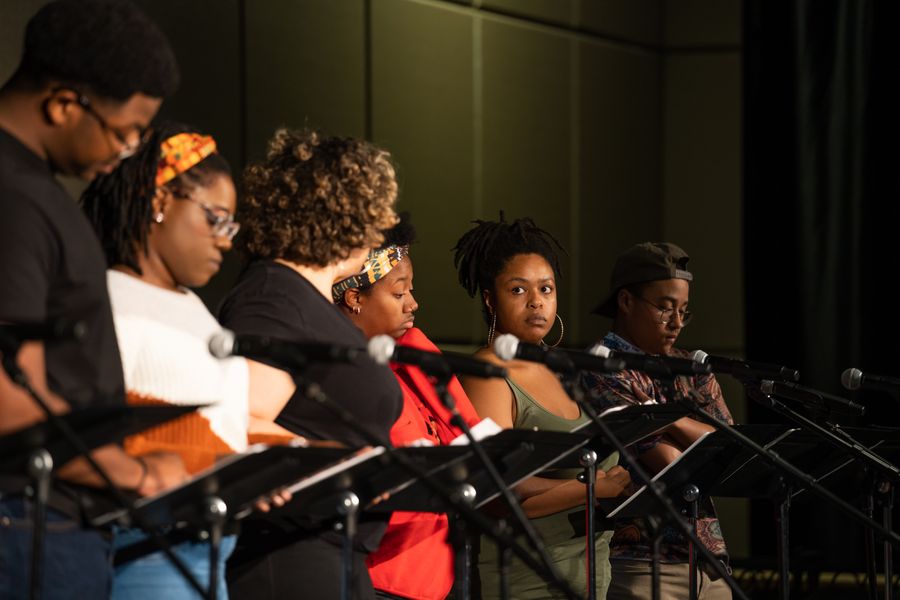Since assuming leadership of the Omaha-based Great Plains Theatre Commons (formerly Conference) in 2009, Kevin Lawler has made the annual event a reflection of his own progressive leanings. The leader’s sensibility infused the the week-long gathering at Metropolitan Community College’s (MCC) historic Fort Omaha campus May 29-June 4, where 14 playwrights had the time and space to develop work addressing loaded issues in both the theatre and the larger society via readings, workshops, and panels. Their plays dealt with misogyny, gaslighting, gentrification, racism, family secrets, and generational trauma. Content warnings preceded several readings.
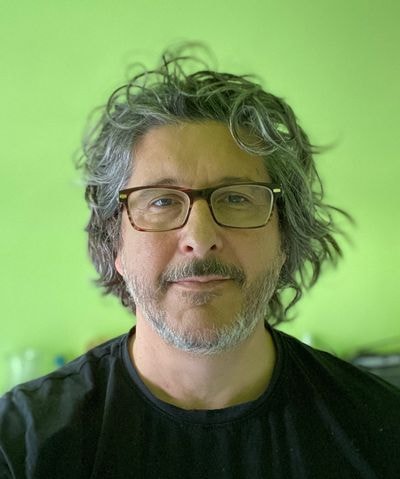
Panels tackled nontraditional play structures, the agency of story, dramaturg and design concerns, and institutions struggling with skeletons in the closet and living up to Equity, Diversity, and Inclusion pledges. Exhilaration mixed with exhaustion. As conference coordinator Quinn Metal Corbin put it, “An already packed week full of emotional and artistic things can be tiring.”
New Jersey playwright Tina Esper, whose play Neighbor Jane was among those given a PlayLab reading, described a whirlwind of “taking in a lot of information and needing time to process it all.”
GPTC’s intentionality around representation resulted in plays by artists identifying as women, Korean Americans, African Americans, gay, straight, and more. Cultural sensitivity followed in the matching of directors, dramaturgs, and actors with playwrights. As L.A. playwright Sarah Cho (Stains, another PlayLab offering) noted, “It was a very special relationship to have a Korean director (Hansol Jung) and a Korean dramaturg (Jihye Kim) for this play,” adding that it seemed “amazing” to her that this should happen in Omaha.
And Stains wasn’t even actor Yoon Cho’s only chance to portray an aspect of the Korean American experience: She also appeared in Stephanie Kyung Sun Walters’ Acetone Wishes and Plexiglass Dreams. “I am glad these wonderful playwrights were able to show there is a whole spectrum of different Korean experiences,” Yoon Cho said. Like Sarah Cho, she admitted that this wasn’t what she expected from a Midwestern new play festival. “I’m really blown away that there’s actually more diversity in the plays here than in the Bay Area,” she marveled.
Added North Hollywood playwright LaDarrion Williams (Coco Queens), “There is change happening in theatre, and it takes places like Great Plains to make that change. They’re doing the work, they’re inviting people of all identities to come into this space to create and to talk about our experiences as artists. We’re engaging with folks who I feel we would never get together with outside of this world. It’s really interesting to see.”
The diversity on display was carefully curated. Explained Lawler, “Years ago we made the application process for submitting plays 100 percent anonymous. That means the readers don’t know anything about the playwrights.” The range of offerings, then, is “based just upon the story and the script. We have no idea what mix of people we’re going to get.” He said he’s been heartened to see that mix grow more various, which he attributes to the fact that “the whole country is working to increase diversity and voices, and to increase access in institutions and events. With that more people feel energized to send in work.”
Kim Louise, who “graduated” from conference volunteer to playwright over GPTC’s history, said she has witnessed a maturation. “Now it resonates with more cultural diversity,” she said. “It’s more representative of the people who are actually writing plays. It’s like a buffet where you get to sample a little bit of everything that’s out there.”
Bicoastal playwright Jennifer Maisel (Yellow Wallpaper 2.0 2020) said she appreciates the conference as a home for female playwrights of a certain age, like herself. “We see a lot of conferences where everyone is young, but when I was young those opportunities weren’t there,” she said. “A really important thing I see in Omaha is several older playwrights, two of whom are women,” referring to herself and Esper.
Omaha playwright Ellen Struve, whose title with the GPTC is community connector, said that the enrichment and empowerment of a convening like this is because it “allows people to see the myriad of possibility they may not have realized was there before in terms of different disciplines, different ways to write a show. Storytelling techniques are wide open, representation is wide open. To bounce from one style or kind of play to another is really exciting.”
Sarah Cho said she “felt like all the plays are conversations with each other—the spirit of it all, the stories we’re telling in America, the conversations happening. It’s really cool.”
Though back in person for the first time since 2019, pandemic cautions were still in place, with organizers requiring masks and regrettably having to cancel a showcase production due to an outbreak. “With so many people, so many things happening, we all had to recalibrate,” said conference organizer Corbin.
It was especially bittersweet: Fresh off the triumph of the February world premiere of her In the Upper Room at Denver Center for the Performing Arts, Omaha-based playwright Beaufield Berry was bringing the play back to where it started, with a PlayLab reading at GPTC in 2017, for a full production as a sort of bonus conference offering; it was to be staged June 1-3 at nearby Creighton University’s Lied Center. After plans for a full production had been twice waylaid by the pandemic, Lawler said that the return to rehearsal “was supercharged with joy and excitement. The cast came together to form this really beautiful, supportive group. The energy, driven by Denise Chapman, the director, was extraordinary.”
But mere hours before opening, COVID cases in the company led to a cancellation of all three performances of In the Upper Room. “It was devastating,” Lawler said. “There was a grieving period for losing that, yet the conference went on.”
In lieu of the show, a last-minute devised program saw Lawler interview Berry and the show’s designer below the fully dressed stage before a live crowd. As a final grace note, Berry and actor Levy Lee Simon performed an impromptu scene from the drama, which is drawn from the playwright’s own family. She played John, her grandfather, opposite Simon as Eddie, her great-grandfather.
GPTC organizers say they’re committed to staging Upper Room at a later date. “It’s a big production,” Lawler conceded. “It will take time to regather that energy and get the right time and space for it again.”
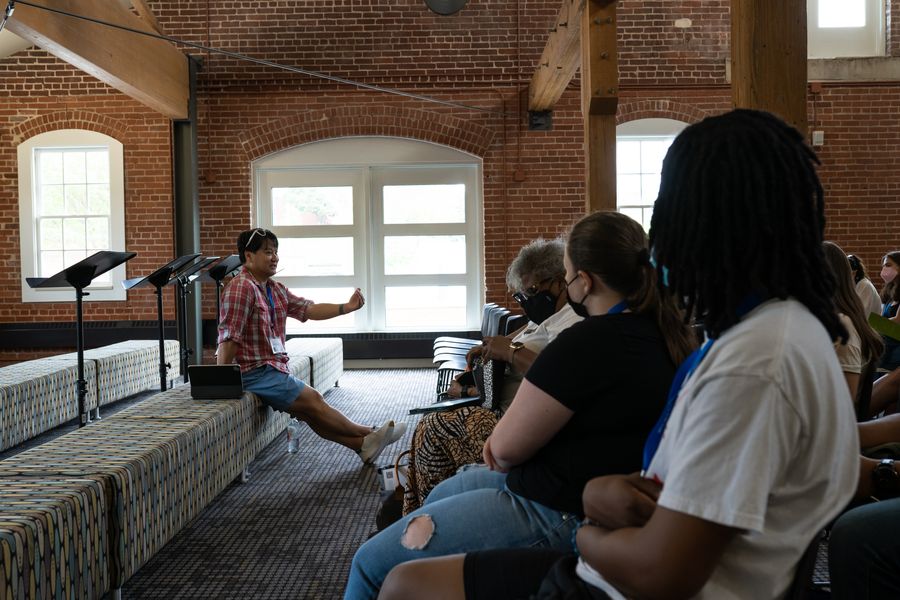
Yet somehow in this immersive, intense, still-tinged-by-pandemic experience, a Zen spirit prevailed. Conference veteran Scott Working of Omaha ascribed it to Lawler’s own chill demeanor.
“It comes from Kevin’s leadership for the most part,” said Working. “He’s such a generous, spiritual, thoughtful person. I’ve always felt organizations take on the personality of the leadership, and he’s an amazing guy. That translates through here in everything we do. The vibe permeates,” said Working, invoking his pony-tailed colleague’s Big Lebowski-ness.
That laidback ethos is why actor-playwright Levy Lee Simon keeps returning, he said. “I look forward to it. I put it on my calendar that every year I’ve got these eight or nine days in Omaha. You know, everything starts at the top, and it’s a good group of people. It kind of radiates from them.”
But Lawler won’t accept full credit for GPTC, instead positing that the event takes its lead from participants.
“The biology of the conference is the biology of the guest artists, playwrights, actors, directors, dramaturgs,” he said, “and this year we had a very sharp, deep-feeling group.” As with any gathering of disparate personalities, clashes do occur, and among Lawler’s many hats is a virtual fireman’s helmet when conflicts flare. “Sometimes the fire shouldn’t be put out—sometimes it needs to burn a little bit, and conversations need to happen in the heat. Then something new arises out of that. We try to be cognizant of not just trying to pacify all situations, but to really listen and help support what needs to happen.”
With so much to juggle, he quipped, “One of these years I’ll get to see this conference.”
It has helped, Working said, the conference downsized in recent years to give more individual attention to playwrights and process, a recurring discussion theme during the week. Whereas the conference used to present upwards of 60 to 70 play readings (including one-acts and excerpts).in the span of a week, and often schedule as many as three or four play lab reading simultaneously, the programming has been streamlined to 14 playwrights and one reading per time block, with more breaks between sessions. The result, as Working put it, is “more playwright-friendly, less competitive. It’s more of a nurturing thing.” Concurred Hansol Jung, “There is not an emphasis on, like, what is the product of the reading? It is very artist-focused, artist-driven.”
College-sponsored from its start in 2006 through 2019, GPTC became its own nonprofit in 2020, expanding from the spring conference to year-round support for emerging playwrights while scaling back the size of the annual gathering. As such, Maisel said that GPTC compares favorably to the now disbanded Sundance Theatre Playwright’s Retreat for its focus on, as she put it, “We want you to be taken care of, we want you not to think about your meals so you can think about your writing, we want to be here if you have an issue with anybody on your creative team, we want you to find new people in your peer group that you may want to work with.” In short, said Maisel, “It feels like they’re doing it right.”
Stephanie Kyung Sun Walters said she cherished the time the conference afforded her to work on her play.
“Just a week away from ‘real life’ allows me to fully focus on the play and the work that needs to be done,” Walters said. “I don’t have to worry about laundry, meals, or my day job. It’s such a blessing. I get to wake up every day and just write and surround myself with creatives. Conferences like this are so essential to new-play development. Until real live people speak the words aloud, it’s not fully real for me.”
Indeed, for many playwrights, this was their first time hearing their words spoken out loud in person. Said playwright Nia Akilah Robinson (Deadass), “It is very valuable to have this opportunity because of how invested artists are in play development. I had time-space to release/dream at GPTC.”
Playwright Gloria Majule also counted herself “grateful for the care and thought that went behind the curation of the team” for her play, Culture Shock. These included dramaturg Khalid Long and director Bryan Moore, as well as “responders” Mfoniso Udofia and Josh Wilder. Both of these colleagues “gave me great nuances and insights into the play I hadn’t thought about.”
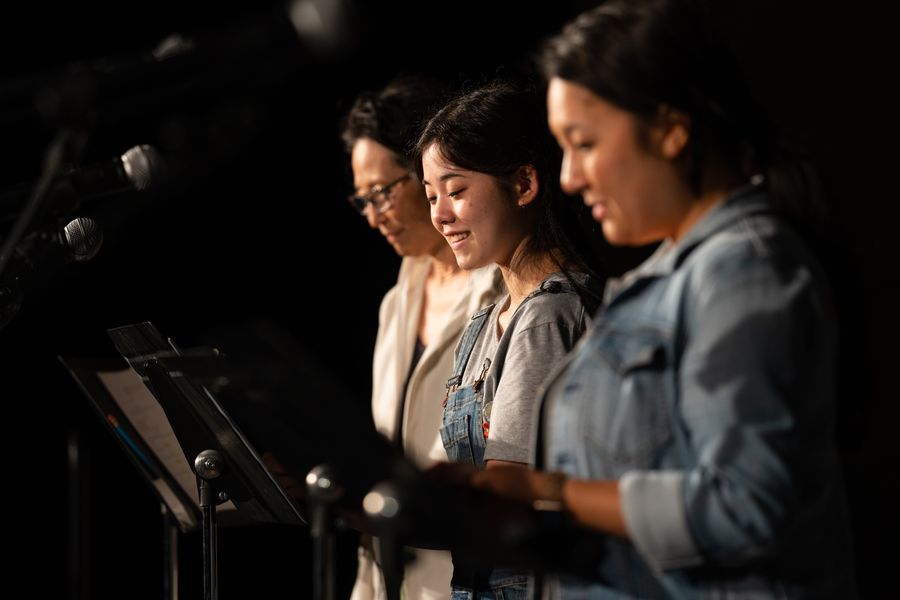
This community aspect can’t be overstated, said Lawler. “The artists all kind of form a family together, because everybody is supporting each other’s work and sitting down to break bread with each other multiple times a day. This type of community can be life-saving, especially in an art form where isolation can be pretty heavy.”
Said Struve, “I’ve certainly experienced that as a writer myself. I’ve gotten more productions through fellow playwrights at conferences than anywhere else because we advocate for one another’s work and spread the word.”
GPTC also celebrates its own. Beaufield Berry has been everything from conference ambassador and party hostess to actress, director, responder, and playwright. “I grew up at the conference,” said Berry, who recently nabbed the gig to write the book for a Josephine Baker musical biopic headed for Broadway. “Her trajectory is extremely exciting,” Corbin added.
Just as Berry got exposed to and inspired by the works of writers like David Lindsay-Abaire, Connie Congdon, and others at GPTC, so did Struve. “I know for a fact the conference has encouraged a ton of local writers,” she said. “It’s also demystified playwriting by showing that new work isn’t perfect, there is a process to it, there is an engagement to it, there is a place for it. It’s influenced all of us in that way, too.”
As a consequence, Lawler said. “It feels like there’s much more of a writers-playwrights community here—people are actively working on creating new work here in a way that I don’t think happened before on the scale it is now.”
Indeed a certain “cross-pollination” occurs between the visiting guest artists and the local theatre community, which sources much of the acting talent. In its early incarnation, local theatre artists were silo-ed off from the visiting artists. “Now it’s much more of a crossover experience, where people from different theaters work with each other,” Corbin said.
GPTC can also act as a magnet to draw back native Nebraskan talents. Noted Corbin, “People from here who’ve left for other places have GPTC as a base for theatre and new plays. Wai Yim, formerly with Omaha’s aetherplough, is in Chicago now, but came back to direct a piece this year.”
Likewise, Don Nguyen, former artistic director of Omaha’s Shelterbelt, left for New York nearly two decades ago. This year marked his first GPTC. From afar, and now firsthand, he’s seen this incubator grow in impressive directions.
“It’s so thrilling to see what’s happening,” said Nguyen, who served as a responder and workshop presenter. “To have it year-round means constant support and visibility of new work, and new work is what keeps theatre alive. I think it’s so fantastic the Omaha theatre community has invested in this integral part of theatre. I think it’s really crucial for developing audiences as well.”
He noted especially the collaboration at the core of GPTC.
“To go away and be a writer in solitude is one thing,” said Nguyen, whom the GPTC has commissioned to pen an original community-based theatre piece. “Some people love doing that, and sometimes it’s necessary. But I always feel like the real work in developing a play actually happens in a room full of people you are collaborating with, whether with fellow writers you’re sharing pages with, or fellow actors and directors with whom you’re trying to get your play up on its feet.”
The power of gathering and communing is perhaps ever more self-evident.
“With the way things are in the country, it is easy to feel distant from one another,” said Struve. “Having this amount of artists from all over helps us all feel closer. Sharing our stories is a way to get to know one another’s hearts. There isn’t a single human deeply involved in theatre the last few years who hasn’t learned how to pivot. I think the generosity and energy we’ve learned to give one another was really in effect this year.”
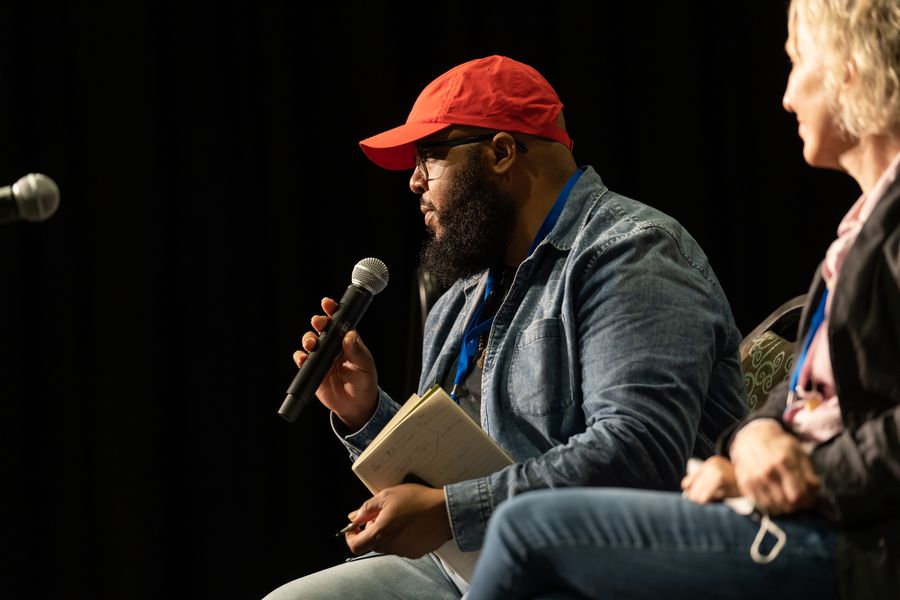
While there are plenty of networking opportunities for typically shy playwrights, GPTC doesn’t have an industry audition atmosphere, which takes some of the pressure off.
“If there were industry people, would I be as comfortable bringing it in the stage it’s at? I’d probably want to perfect it more,” said Esper. “It’s nice to be like, ‘This is still messy, I’m still kind of figuring it out,’ and being told, ‘That’s great, we just want to talk to you about it.’ And in the most supportive way, they encourage you to explore new ways to work the play, to push it forward.”
Maisel said the difference between the previous GPTC conference she attended in 2012 and the 2022 event was night and day. “Before it felt like a competitive battle to try to keep different readings happening at the same time. Now I feel like there’s opportunity for more cohesiveness and camaraderie amongst the playwrights. It’s much less frenetic.”
“There is no end goal to get to a production or something of high stakes like that,” said Nguyen.
This is in part the result of GPTC’s streamlining from a jam-packed schedule to a sequence of 14 plays, which has removed the sense of hierarchy and competition. “For years there were mainstage readings and then the rest of the other plays,” said Working. “That fostered ill feelings of, ‘Well, why is that play up there and mine is down here?’ Since the mainstage went away, the competition has gone away. This year for the first time, everybody could see every play. They didn’t have to choose between one of three in a particular time slot. It’s a tighter, well-oiled machine. The emphasis can be on hospitality, which we’re pretty good at. It’s still the same kind of congenial atmosphere. It still feels like theatre camp for adults. It’s gotten smaller but better.”
GPTC regulars come for the work and collegiality, said Simon, who added, “It doesn’t hurt that the food is so good. I’m halfway joking, but I’m not. We get fed, and the food is just exceptional.”
It’s a sentiment echoed by nearly every participant, as the conference enjoys a cozy relationship with MCC’s Institute for the Culinary Arts, whose staff prepare what Lawler called “healthy, wonderful, vibrant, soulful food.” Most of the event unfolds at the Institute’s Scott Conference Center. Breakfast and snacks are had at its Sage Student Bistro.
An indication of how much attendees savor the food was the rousing ovation that went up when Lawler invited a show of appreciation for the Institute’s labors at the closing night celebration. That event was also filled with tearful goodbyes and recognition of the financial support that keeps the conference entirely free.
“What’s allowed the conference to last this long is the passion, the commitment, the tremendous engagement of our local community,” said Struve. “It feels like a big family reunion we keep inviting people to experience for the first time. Then they become part of our family and community. There’s a really strong nexus of support, engagement, and talent that happens.”
Exiting the conference, Tina Esper said, “Every conference has something worthwhile, but there’s this energy here that’s distinctly different.” After a week of close collaboration with fellow members of her theatre tribe, she said, “You make friends, you feel reconnected with the family you’ve never known, realizing we’ll never reconnect in this way again.”
Leo Adam Biga (he/him) is an Omaha-based freelance writer and the author of the 2016 book Alexander Payne: His Journey in Film.

